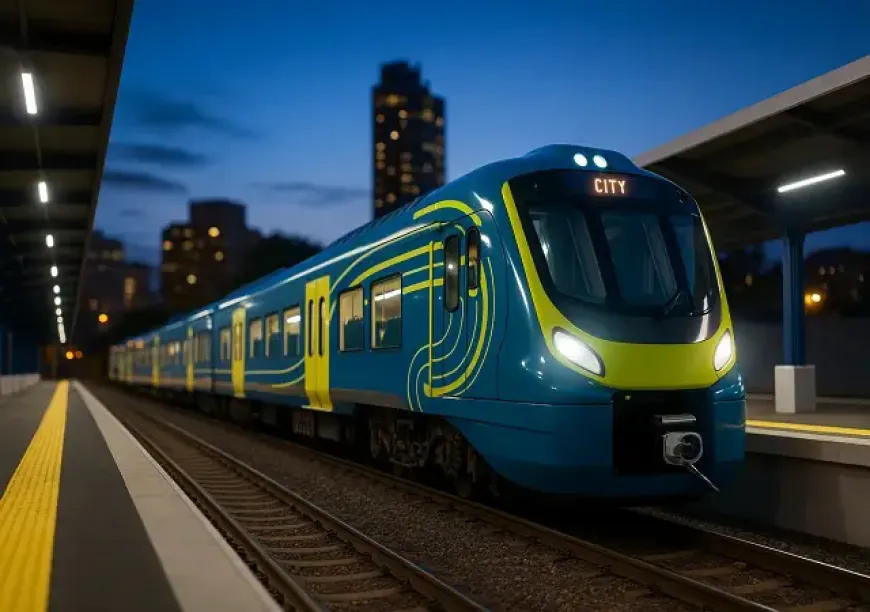New Zealand's First Battery-Electric Commuter Trains
Alstom secures landmark €538M Wellington contract for 18 Tūhono battery-electric trains. Discover New Zealand's rail revolution towards zero emissions.

Standfirst: French rail giant Alstom wins a €538 million contract to supply 18 Tūhono battery-electric trains to Wellington, marking an ecological revolution in New Zealand public transport.
Updated on September 8, 2025
A New Era for Sustainable Mobility in New Zealand
Alstom has secured one of its most significant contracts in the Asia-Pacific region: €538 million to equip Wellington with its first battery-electric commuter trains. These Tūhono units will completely replace the existing diesel fleet by 2028-2029, propelling New Zealand's capital towards zero direct emission rail operations.
This landmark order positions New Zealand at the forefront of sustainable mobility, featuring cutting-edge technology adapted to local geographical specificities.
The €538 Million Contract: Key Details and Collaborative Vision
Financial Scope and Fleet Details
The contract totals €538 million (NZ$1.065 billion) covering the design, manufacture, and supply of 18 Adessia Stream B battery-electric multiple unit (BEMU) 5-car trains. This order also includes an extensive 35-year FlexCare Perform fleet maintenance agreement, ensuring optimal fleet availability.
The contract was booked in the second quarter of fiscal year 2025-2026, consolidating Alstom's position in the Oceanic market.
Partnership Driving Progress
This success results from close collaboration between the Greater Wellington Regional Council, Ministry of Transport, New Zealand Transport Agency, Greater Wellington and Horizon's Regional Councils, Transdev, and KiwiRail.
Pascal Dupond, Managing Director of Alstom Australia and New Zealand, expressed gratitude: "This partnership allows us to bring Alstom's expertise to New Zealand for the first time."
Introducing 'Tūhono': New Zealand's First Battery-Electric Commuter Fleet
A Name Rooted in Culture: 'Tūhono'
The trains bear the name "Tūhono," meaning "to connect" or "to unite" in Māori. This denomination reflects the integration of Te ao Māori and cultural elements into the train livery, designed by Māori agency Indigenous Design and Innovation in consultation with local communities.
This cultural approach differentiates the project and strengthens the territorial anchoring of these new units.
Designed for Comfort and Capacity
Each Tūhono unit will carry up to 475 passengers at maximum speeds of 120 kph. The design prioritizes comfort with dedicated arrangements for wheelchairs, bikes, luggage, and prams, complemented by onboard toilets, vending machines, and water dispensers.
These trains are based on Alstom's globally proven Adessia commuter trains platform, adapted for Wellington's specific needs.
A Green Leap Forward: Zero-Emission Operations and Network Transformation
Replacing Diesel, Embracing Sustainability
The new fleet will replace current diesel locomotive-hauled trains reaching end-of-life in 2028-2029. These BEMUs will enable emission-free operations on non-electrified segments of Wellington's rail network, specifically the Wairarapa and Manawatu lines.
This energy transition represents a major investment in decarbonizing regional public transport.
Navigating Critical Corridors: The Remutaka Tunnel
The onboard battery will provide a crucial operational advantage: zero-emission operation through sections of the 9km Remutaka Tunnel, a strategic network corridor.
This technical capability solves a major environmental challenge for regional rail operations.
State-of-the-Art Technology & Maintenance for Peak Performance
Advanced Maintenance Solutions
Alstom will deploy its HealthHub condition-based and predictive maintenance technologies. The purpose-built maintenance facility in Masterton, constructed by the Greater Wellington Regional Council and operated by Alstom, will feature the latest technologies for fleet maintenance and battery servicing, ensuring high availability and reliability.
Intelligent Operational Systems
The deployment includes a connected driver advisory system and intelligent train control for optimized operations.
Global Manufacturing Excellence
The fleet will be manufactured at Alstom's Savli facility in India, the group's technological excellence center.
Alstom's Global Leadership in Sustainable Rail Solutions
A Track Record of Innovation and Expertise
Alstom positions itself as "global leader in smart sustainable mobility solutions" and "world's largest end-to-end rail provider, with unparalleled delivery experience." This project marks the first introduction of Alstom trains and maintenance expertise in New Zealand, as well as zero-emissions rail technology in the Asia-Pacific region.
Expanding Battery-Electric Success
Alstom shows sustained growth in BEMU technology, with 60 trains sold for commuter and regional networks since 2020. References include 11 BEMUs for VMS in Germany and 31 for Irish Rail in Ireland. Alstom also modernizes existing fleets by converting diesel-electric and electric trains into BEMUs.
The Road Ahead: Enhancing the Commuter Experience
Full fleet integration is planned for 2028-2029. Alstom commits to delivering "an environmentally friendly, modern and inclusive comfortable journey for every passenger." Ling Fang, Region President Asia-Pacific, anticipates even greater expansion and partnership in the region.
Context & Issues
New Zealand is pursuing an ambitious decarbonization approach for its public transport. This Alstom contract represents a strategic investment in rail technological innovation, positioning Wellington as a regional reference in sustainable mobility.
The challenge goes beyond simple modernization: it involves structurally transforming regional transport offerings while integrating local cultural specificities.
What Changes for Users
Travelers will benefit from enhanced comfort, improved punctuality through predictive technologies, and most importantly, completely decarbonized transport on the Wairarapa and Manawatu lines. Māori cultural integration will also strengthen the territorial identity of the public service.


 TrainsNews
TrainsNews 





